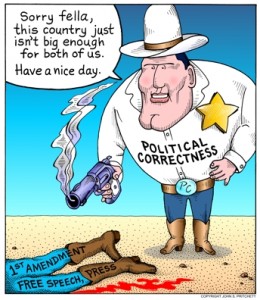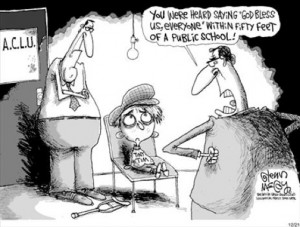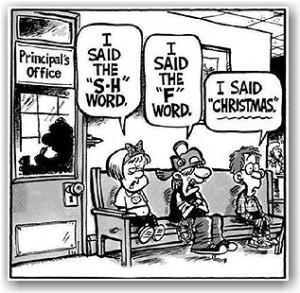People are defined by their deeds, their actions. Not their words. But the way we communicate can be both reflective of our behavior and an influence on it going forward.
 What we call political correctness, for example, reflects societal behavior, how our culture has changed. It also influences societal behavior. In that sense, it reinforces the trajectory of that cultural change.
What we call political correctness, for example, reflects societal behavior, how our culture has changed. It also influences societal behavior. In that sense, it reinforces the trajectory of that cultural change.
That makes it a powerful way to understand where we are and where we’re going as a nation, as an economy, and as people. It also shows the effect our words have on how we lead, how we work, and how we live.
How the trend toward political correctness came into being is anyone’s guess. At this point, it doesn’t really matter. It’s everywhere. It’s pervasive. The only way to deal with it is to understand what it is:
It’s collectivism, which destroys individualism. Competition is bad. Everyone’s a winner. Everyone has to be included and treated the same. Singling out individuals as special or unique excludes others, so that’s out. Lost is individual responsibility and accountability, the drive to compete and win, the motivation to be recognized for achievement and superior performance.
It levels the playing field, brings everyone down to the lowest common denominator. Star performers have to take it down a notch so everyone can be included. Like when you bring slower students into a gifted class, everything has to be dumbed down. It diminishes team performance and organizational effectiveness.
 Everything has to be filtered to ensure no one is offended or gets into trouble. That slows down information processing, waters down communication, strips out critical data, and dilutes meaning. As a result, it undermines genuine understanding and effective decision-making.
Everything has to be filtered to ensure no one is offended or gets into trouble. That slows down information processing, waters down communication, strips out critical data, and dilutes meaning. As a result, it undermines genuine understanding and effective decision-making.
Now, here’s the confusing part. Finger pointing and blaming others is tolerated, even encouraged. Leaders blame their predecessors; parents blame teachers; society blames victims. It’s everybody’s fault but whoever is really responsible. That’s because nobody is accountable. There are no enemies or bad guys. That wouldn’t be inclusive. Including them will fix them.
In short, it’s Ayn Rand’s Atlas Shrugged come to life. It’s a nightmare. And its implications are far reaching.
The Boston Marathon bombing wasn’t the fault of some sick, twisted, cowardly, barbarian terrorists, “It was tax day,” according to former Obama advisor David Axelrod . And former Congressman Barney Frank
. And former Congressman Barney Frank used it as an opportunity to make a political argument for a “well-funded” government.
used it as an opportunity to make a political argument for a “well-funded” government.
Nobody can blame President Obama for our out of control debt and sluggish economy. Of course not. It’s former President Bush’s fault.
 Former secretary of State Hillary Clinton isn’t responsible for the Benghazi attacks and four murdered Americans including Ambassador Chris Stevens; it’s a congressional funding problem.
Former secretary of State Hillary Clinton isn’t responsible for the Benghazi attacks and four murdered Americans including Ambassador Chris Stevens; it’s a congressional funding problem.
Business leaders and managers are less willing to give employees genuine feedback because they’re afraid of being sued or accused of harassment, discrimination, or being a bully. You can’t even compliment how someone looks or show any genuine emotions anymore. That might create a hostile work environment.
When you remove personal responsibility by telling people they’re doing great when they’re not and giving them stuff for doing nothing, in time, they feel like they deserve it. That’s where our growing entitlement culture is coming from.
And when we fail to provide people with incentives to work hard and live in a fiscally responsible way as a means to long-term happiness and security, guess what they do? They sit on their butts all day and Tweet, like, update, play games, watch reality TV, and get fatter and fatter.
 And how about our growing youth violence problem? If you don’t teach children personal responsibility – adult responsibility – they never grow up. And what do children do when you don’t give them attention? They throw tantrums. And any good shrink will tell you, if children can’t get positive recognition, they’ll take negative attention instead. Anything that’s self-affirming, that feeds their egos.
And how about our growing youth violence problem? If you don’t teach children personal responsibility – adult responsibility – they never grow up. And what do children do when you don’t give them attention? They throw tantrums. And any good shrink will tell you, if children can’t get positive recognition, they’ll take negative attention instead. Anything that’s self-affirming, that feeds their egos.
While it’s clear that political correctness is reflective of our societal norms, it also influences where our culture is heading. If I’m not mistaken, it’s turning us into a nation of people who look like adults but act like entitled children, who act out when they don’t get what they want or feel they deserve.
How do we stop that from happening? Don’t be politically correct. Here’s how:
Behave like an adult.
Hold yourself and others accountable.
Don’t try to be something you’re not.
Say what you mean and mean what you say.
Have a sense of humor, humility, and perspective.
Work hard, play to win, and respect the competition.
Don’t be afraid to do the right thing, no matter what.
Be proud of yourself, your loved ones, and all your accomplishments.
By Steve Tobak, a Silicon Valley-based strategy consultant and former senior executive of the technology industry. Contact Tobak; follow him on Facebook, Twitter, or LinkedIn.

Leave a Reply